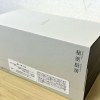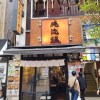
Japanese supercomputer shows how high a barrier you need if your coworker won’t show basic courtesy during the coronavirus crisis.
With the lifting of local governments’ official states of coronavirus emergency in Japan, a number of people who have been telecommuting from home are now transitioning back to working in offices. At the same time, though, health officials are still largely encouraging people to refrain from gatherings with other people.
Those two things are sort of opposites, since it doesn’t matter if you’re spending time in a movie theater, restaurant, or office – being around others in an enclosed space can increase the risk of coronavirus transmission, and there’s a particularly concerning aspect with Japanese offices.
As shown in the photo above, in Japan, most office workers don’t have private offices. Even upper managers generally sit in a common room with the rest of the staff, with workers taking a seat at “islands” of desks. For pretty much your whole shift, you’ve got someone next to you, and also in front of you, who’s facing you as they sit on the opposite side of the table.
Obviously, that means a lot of people breathing on, or at least close to, each other, which isn’t a desirable situation with an airborne virus going around. But what’s even worse is what happens when someone coughs without covering their mouth.
Japan’s RIKEN Center for Biosystems Dynamics Research, also known as the Institute of Physical and Chemical Research, recently ran a simulation of what happens to all the particles that fly out of a person’s mouth when they cough. The video below shows the results, and as you’ll see when you hit play, they’re disgusting and disturbing.
新型コロナウイルスの感染に関わる、せきなどの飛まつがどう広がるのか、最新のスーパーコンピューターで予測した動画を、神戸市の理化学研究所が公開しました。https://t.co/FZNamBaSGm pic.twitter.com/kdKars8KH1
— NHKニュース (@nhk_news) June 4, 2020
The simulation at the start of the video shows what would happen even if Japanese offices added mouth-high solid barriers between workers. After the stream of particles initially contacts the barrier, their momentum takes them up and over the wall. At first it looks like they’re going to drift away, but as the clear the top of the barrier their speed slows, and they settle back down directly into the face of the person sitting in front of the cougher.
The simulation was performed using RIKEN’s Fujitsu-processor Fugaku supercomputer. A second test, shown at the video’s 8-second mark, shows that in order to keep the person in front of the cougher from being smothered in particulate matter, the barrier would have to be as high as the top of the cougher’s head, and even then some of the mouth-sourced funk falls onto the other person’s desk.
There’s more bad news at the video’s 22-second mark, which shows a train. While it might look unrealistically crowded to commuters from other countries, such conditions are common at rush hour in Japan’s largest cities.
For this simulation, RIKEN calculated what would happen to the flow of air on such a train if it were moving at a speed of 80 kilometers (49.7 miles) per hour with its windows open. As the colored lines show, the air moves about the carriage, but never really leaves the train, and thus no significant ventilation is taking place. Many rail operators in Japan have begun leaving their trains’ windows open as a coronavirus countermeasure, but RIKEN’s simulation says that if the trains are as crowded as they usually are when everyone is commuting to work, it really won’t make a difference.
With Tokyo’s infection numbers showing an uptick this week, hopefully RIKEN’s data will encourage employers to allow employees who can to work from home, and even if it doesn’t, it’s a sobering reminder that continuing to wear a mask while at the office is a wise choice, and that above all else you should always, always cover your mouth when you cough.
Source: NHK News Web via Jin
Top image: Pakutaso
Insert images: Pakutaso (1, 2)
● Want to hear about SoraNews24’s latest articles as soon as they’re published? Follow us on Facebook and Twitter!
Follow Casey on Twitter, where in addition to the importance of covering your mouth, he thinks the Fugaku simulation is also an important reminder of the importance of breath mints.



 World-first confirmation that masks can protect you from coronavirus【Video】
World-first confirmation that masks can protect you from coronavirus【Video】 Japanese company tells worker he probably doesn’t have coronavirus, to come to work with a fever
Japanese company tells worker he probably doesn’t have coronavirus, to come to work with a fever Japan bad train manners survey reminds us of three things to watch out for while riding the rails
Japan bad train manners survey reminds us of three things to watch out for while riding the rails No Tokyo cherry blossom parties? Government asks citizens to refrain from outdoor hanami parties
No Tokyo cherry blossom parties? Government asks citizens to refrain from outdoor hanami parties No screaming on roller coasters, please, say Tokyo Disneyland, other Japanese amusement parks
No screaming on roller coasters, please, say Tokyo Disneyland, other Japanese amusement parks A trip to hell on Japan’s ‘vomit ship’: Is it as bad as everyone says it is?
A trip to hell on Japan’s ‘vomit ship’: Is it as bad as everyone says it is? Japanese ramen restaurants under pressure from new yen banknotes
Japanese ramen restaurants under pressure from new yen banknotes New private rooms on Tokaido Shinkansen change the way we travel from Tokyo to Kyoto
New private rooms on Tokaido Shinkansen change the way we travel from Tokyo to Kyoto McDonald’s new Happy Meals offer up cute and practical Sanrio lifestyle goods
McDonald’s new Happy Meals offer up cute and practical Sanrio lifestyle goods French Fries Bread in Tokyo’s Shibuya becomes a hit on social media
French Fries Bread in Tokyo’s Shibuya becomes a hit on social media Secret Kitchen bento serves Japanese flowers, birds, wind and moon in a box, but is it worth it?
Secret Kitchen bento serves Japanese flowers, birds, wind and moon in a box, but is it worth it? Sakura tree falls on man at Sannenzaka near Kiyomizu temple in Kyoto 【Breaking News】
Sakura tree falls on man at Sannenzaka near Kiyomizu temple in Kyoto 【Breaking News】 Studio Ghibli releases new action figures featuring Nausicaä of the Valley of the Wind characters
Studio Ghibli releases new action figures featuring Nausicaä of the Valley of the Wind characters Wendy’s releases a Pretzel Roast Beef Burger aimed at foreign tourists in Japan
Wendy’s releases a Pretzel Roast Beef Burger aimed at foreign tourists in Japan Non-ramen Ramen Restaurant Stars: The quest begins at Tokyo’s Oreryu Shio
Non-ramen Ramen Restaurant Stars: The quest begins at Tokyo’s Oreryu Shio All-you-can-drink Starbucks and amazing views part of Tokyo’s new 170 meter-high sky lounge
All-you-can-drink Starbucks and amazing views part of Tokyo’s new 170 meter-high sky lounge More foreign tourists than ever before in history visited Japan last month
More foreign tourists than ever before in history visited Japan last month Starbucks reopens at Shibuya Scramble Crossing with new look and design concept
Starbucks reopens at Shibuya Scramble Crossing with new look and design concept Disney princesses get official manga makeovers for Manga Princess Cafe opening in Tokyo
Disney princesses get official manga makeovers for Manga Princess Cafe opening in Tokyo Beautiful new Final Fantasy T-shirt collection on the way from Uniqlo【Photos】
Beautiful new Final Fantasy T-shirt collection on the way from Uniqlo【Photos】 Is the new Shinkansen Train Desk ticket worth it?
Is the new Shinkansen Train Desk ticket worth it? Studio Ghibli glasses cases let anime characters keep an eye on your spectacles
Studio Ghibli glasses cases let anime characters keep an eye on your spectacles Studio Ghibli releases Kiki’s Delivery Service chocolate cake pouches in Japan
Studio Ghibli releases Kiki’s Delivery Service chocolate cake pouches in Japan New definition of “Japanese whiskey” goes into effect to prevent fakes from fooling overseas buyers
New definition of “Japanese whiskey” goes into effect to prevent fakes from fooling overseas buyers Our Japanese reporter visits Costco in the U.S., finds super American and very Japanese things
Our Japanese reporter visits Costco in the U.S., finds super American and very Japanese things Studio Ghibli unveils Mother’s Day gift set that captures the love in My Neighbour Totoro
Studio Ghibli unveils Mother’s Day gift set that captures the love in My Neighbour Totoro Domino’s Japan now sells…pizza ears?
Domino’s Japan now sells…pizza ears? New Japanese KitKat flavour stars Sanrio characters, including Hello Kitty
New Japanese KitKat flavour stars Sanrio characters, including Hello Kitty New Pokémon cakes let you eat your way through Pikachu and all the Eevee evolutions
New Pokémon cakes let you eat your way through Pikachu and all the Eevee evolutions Sales of Japan’s most convenient train ticket/shopping payment cards suspended indefinitely
Sales of Japan’s most convenient train ticket/shopping payment cards suspended indefinitely Sold-out Studio Ghibli desktop humidifiers are back so Totoro can help you through the dry season
Sold-out Studio Ghibli desktop humidifiers are back so Totoro can help you through the dry season Japanese government to make first change to romanization spelling rules since the 1950s
Japanese government to make first change to romanization spelling rules since the 1950s Ghibli founders Toshio Suzuki and Hayao Miyazaki contribute to Japanese whisky Totoro label design
Ghibli founders Toshio Suzuki and Hayao Miyazaki contribute to Japanese whisky Totoro label design Doraemon found buried at sea as scene from 1993 anime becomes real life【Photos】
Doraemon found buried at sea as scene from 1993 anime becomes real life【Photos】 Tokyo’s most famous Starbucks is closed
Tokyo’s most famous Starbucks is closed One Piece characters’ nationalities revealed, but fans have mixed opinions
One Piece characters’ nationalities revealed, but fans have mixed opinions We asked a Uniqlo employee what four things we should buy and their suggestions didn’t disappoint
We asked a Uniqlo employee what four things we should buy and their suggestions didn’t disappoint Princesses, fruits, and blacksmiths: Study reveals the 30 most unusual family names in Japan
Princesses, fruits, and blacksmiths: Study reveals the 30 most unusual family names in Japan Tokyo plan to give 100,000 yen to residents who get infected with coronavirus sparks backlash
Tokyo plan to give 100,000 yen to residents who get infected with coronavirus sparks backlash Masks should still be worn indoors, majority of Japanese people in poll say
Masks should still be worn indoors, majority of Japanese people in poll say Train brought to emergency stop because someone coughed in it
Train brought to emergency stop because someone coughed in it Conjure a magical barrier to block virus particles with an anime magic circle-inspired partition
Conjure a magical barrier to block virus particles with an anime magic circle-inspired partition Commuter chaos at Shibuya Station after glass window breaks on door of crowded Japanese train
Commuter chaos at Shibuya Station after glass window breaks on door of crowded Japanese train Is it time for manga and anime to start introducing the coronavirus outbreak to their settings?
Is it time for manga and anime to start introducing the coronavirus outbreak to their settings? Too hot during the blackout? Cool down with an electric fan, veteran newscaster suggests
Too hot during the blackout? Cool down with an electric fan, veteran newscaster suggests Clock in with a kitty at this shared workspace in Japan where you can play with the resident cat
Clock in with a kitty at this shared workspace in Japan where you can play with the resident cat That time a stranger gave us money on a Japanese train
That time a stranger gave us money on a Japanese train Politician’s disgusting mask gaffe grosses out Japan【Video】
Politician’s disgusting mask gaffe grosses out Japan【Video】 Sayonara, smelly salarymen! Japanese company develops self-smell-checking device
Sayonara, smelly salarymen! Japanese company develops self-smell-checking device Hyogo Prefecture to give 320,000 fans to restaurants for customers to cover mouths, dine “safely”
Hyogo Prefecture to give 320,000 fans to restaurants for customers to cover mouths, dine “safely” Final Fantasy developer Square Enix makes working from home a permanent option for employees
Final Fantasy developer Square Enix makes working from home a permanent option for employees Jason calls off Friday the 13th activities due to coronavirus
Jason calls off Friday the 13th activities due to coronavirus Japanese politicians want workers across country to have option for three-day weekends every week
Japanese politicians want workers across country to have option for three-day weekends every week
Leave a Reply